Lincoln and the Indians
Lincoln and the Indians

Lincoln and the Indians
Civil War Policy and Politics
David A. Nichols


1978, 2000, 2012 by David A. Nichols. All rights reserved. No part of this book may be used or reproduced in any manner whatsoever without written permission except in the case of brief quotations embodied in critical articles and reviews. For information, write to the Minnesota Historical Society Press, 345 Kellogg Blvd. W., St. Paul, MN 55102-1906.
www.mhspress.org
The Minnesota Historical Society Press is a member of the Association of American University Presses.
Manufactured in the United States of America
10 9 8 7 6 5 4 3 2 1
 The paper used in this publication meets the minimum requirements of the American National Standard for Information SciencesPermanence for Printed Library Materials, ANSI Z39.48-1984.
The paper used in this publication meets the minimum requirements of the American National Standard for Information SciencesPermanence for Printed Library Materials, ANSI Z39.48-1984.
International Standard Book Number
ISBN: 978-0-87351-875-8 (paper)
ISBN: 978-0-87351-876-5 (e-book)
Library of Congress Cataloging in Publication Data
Nichols, David A 1939
Lincoln and the indians : civil war policy and politics / David A. Nichols.
p. cm.
Originally published : Columbia, MO : University of Missouri Press, 1978. Includes bibliographical references and index.
1. Lincoln, Abraham, 18091865Relations with Indians of North America.
Relations with Indians of North America. 2. Indians of North AmericaGovernment relations. 3. United StatesHistoryCivil War, 18611865. I. Title.
2. Indians of North AmericaGovernment relations. 3. United StatesHistoryCivil War, 18611865. I. Title.
E457.2.N6N53 2012
To the Native Americans who suffered so muchon the American frontier and, in particular,to the Dakota people who have been enthusiasticadvocates for the republication of this book.
Abbreviations in Footnotes
AGOAdjutant Generals Office
ARAnnual Report
CIACommissioner of Indian Affairs
IDIndian Division
JCCW Report of the Joint Committee on the Conduct of the War
LAM, with appropriate yearLincolns Annual Message
LCLibrary of Congress
LRLetters Received
LSLetters Sent
MMicrocopy
NANational Archives
OIAOffice of Indian Affairs
OR The War of the Rebellion: A Compilation of the Official Records of the Union and Confederate Armies (with series, volume, and page numbers listed respectively)
OSIOffice of the Secretary of the Interior
RGRecord Group
SFSpecial File
SISecretary of the Interior
SWSecretary of War
Preface
SURELY, LINCOLN DID NOT HAVE TIME for Indians. That provocative statement is as true today as it was in the 1860s and in 1978, when this book was first published. And now, Lincoln and the Indians is born againthanks to the 150th anniversary of the U.S.Dakota War of 1862 in Minnesota, the passionate interest of Dakota leaders whose ancestors fought in that war, and the generous response of the Minnesota Historical Society Press. I am honored that my Native friends in Minnesota have discovered, in this chronicle, information that enhances their understanding of their own past.
So, let us ask once again: Why did Lincoln, in the midst of a bloody civil conflict, take time to deal with Indian affairs?
First, he took time because of the Civil War itself. In the Indian Territory (now Oklahoma), the so-called five civilized tribes allied themselves with the Confederacy. Lincoln first abandoned the Indian Territory, but a flood of Indian refugees from the Territory into Kansas resulted in intense political pressure on the president to retake it. He eventually approved an expedition that included Native fighters, only to have that expedition torpedoed by Union troops who mutinied against their commander. In the aftermath, Kansas was the scene of a tragedy all too common on the frontierthe presence of starving, suffering, ruthlessly exploited Natives whose situation was made worse by the governments mismanagement.
Lincoln expended even more time and energy in dealing with the Dakota War. When fighting broke out, Minnesotans could not fulfill their commitment to provide soldiers for the war with the South. Lincoln, desperate for manpower, ordered, Attend to the Indians, and dispatched General Alexander Pope to put down the uprising. But, when the fighting ceased, Lincoln was presented with an even more time-consuming, morally wrenching problemPopes plan to execute 303 Dakota men.
What contemporaries called the Indian System was the catalyst for the situations in Kansas and Minnesota. It demanded Lincolns attention because it was a system of political patronage, not a system designed to serve the needs of Indians.
Complex and corrupt to the core, the Indian System was administered by the Office of Indian Affairs and provided financially lucrative jobs to superintendents, Indian agents, and other officials. These officials, in turn, disbursed government largesse to traders, contractors, and claimants. The presidents political allies routinely lined up for these jobs, usually recommended by their states congressional leaders.
The systems operations were both ingenious and cynical. Following warfare, Indian tribes were often removed from land that white men wanted. Removal was formalized by means of sham negotiations with the leaders of allegedly independent tribal nations. A treaty was then signed which, in return for the confiscated land, provided for annuity funds held in trust in Washington. These funds, ostensibly committed to meeting tribal needs, were doled out each year through the Indian Office and, on the local scene, by the Indian agent.
The Indian System revolved around the efforts of rapacious white men to commandeer these monies. Again and again, tribes were moved to barren country where they could not sustain themselves, either by hunting or farming. That opened the monetary floodgates, creating a demand for contractors and traders to provide provisions, with payment overseen by the Indian agent. The system featured every conceivable kind of financial corruptionkickbacks, inflated prices, false claims, and payments for goods and services never actually delivered.
Most of this money never trickled down to the Natives. Starving Indians became commonplace in the West; such starvation was precisely what touched off the Indian war in Minnesota in 1862.
This story reminds us that the issue of money in American politics is not just a modern phenomenon. In Lincolns time, the Indian System provided a pathway to power, whereby ambitious men could get rich and go into politics. It is no accident that the first two governors of Minnesota, Henry Sibley and Alexander Ramsey, were products of this money machine. The enduring contribution of Lincoln and the Indians is its description of this system of institutionalized corruption.
The Indian System cried out for reform, and a handful of brave reformers campaigned for the removal of politics from the system. Minnesotas Episcopal Bishop, Henry Benjamin Whipple, was the most persistent. Whipple lobbied relentlessly for justice for the Indians of his state, personally traveling to Washington to confront Lincoln. Whipples vivid account of tribal suffering so moved the president that Lincoln pledged he would seek reform of the system if we get through this war, and I live.

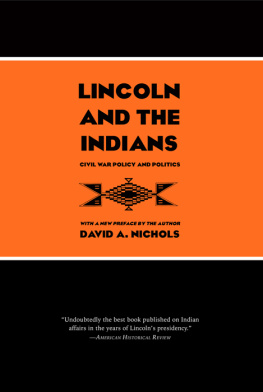
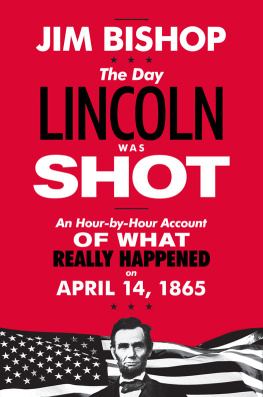

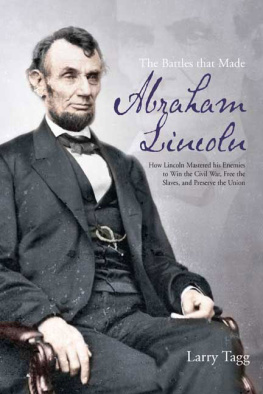
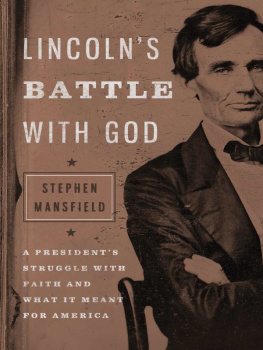
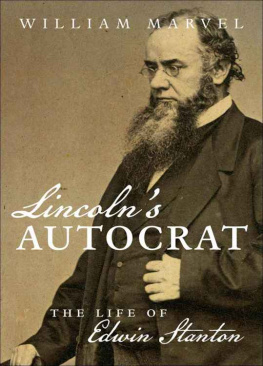
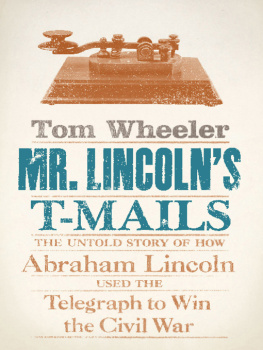
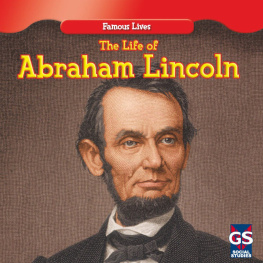

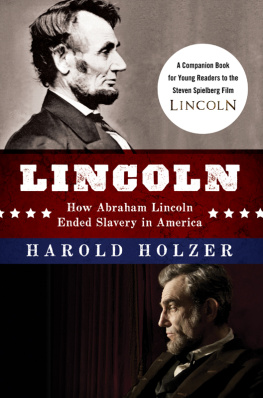
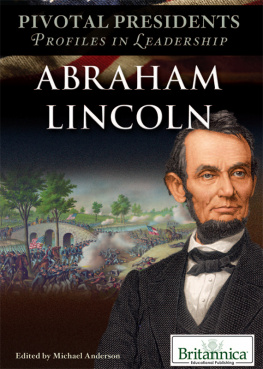

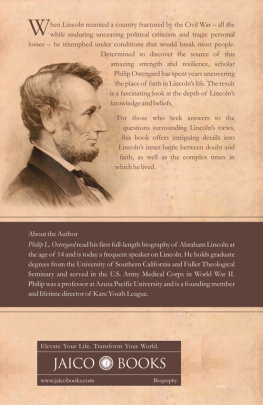

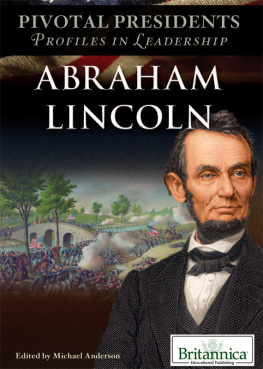





 The paper used in this publication meets the minimum requirements of the American National Standard for Information SciencesPermanence for Printed Library Materials, ANSI Z39.48-1984.
The paper used in this publication meets the minimum requirements of the American National Standard for Information SciencesPermanence for Printed Library Materials, ANSI Z39.48-1984.